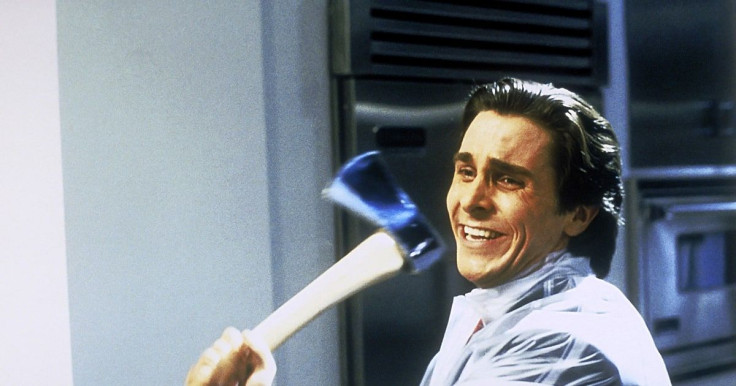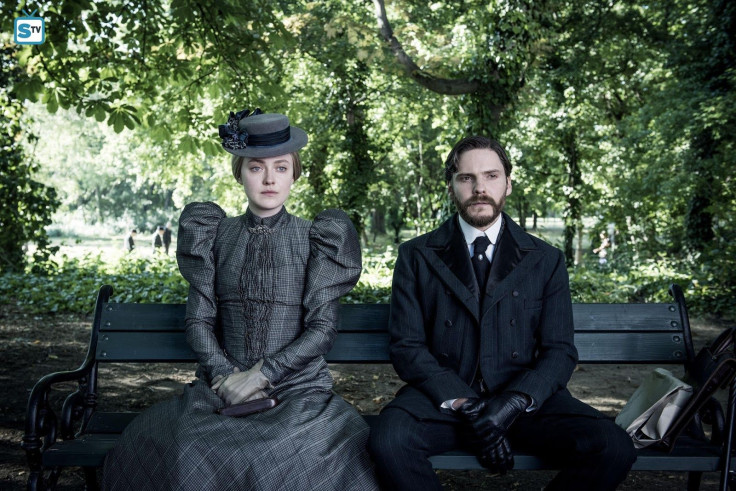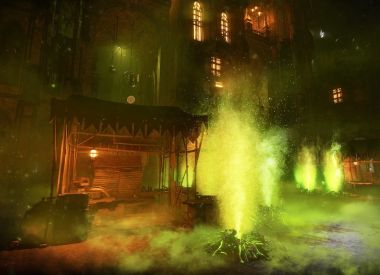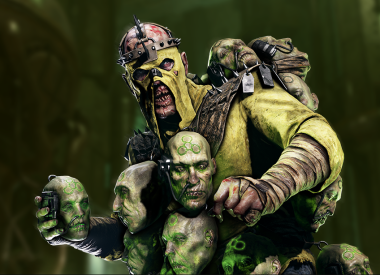One of the most successful dramatic tensions in The Alienist is between the interior and the societal. Sara Howard (Dakota Fanning), Dr. Kreizler (Daniel Brühl) and John Moore (Luke Evans) search the unexplored dark places in human psychology, but find their biggest enemy in the institutions — the police, the press, and over them all, the rich — whose power works in spite of individual human thought processes. And by the end of the fourth episode of The Alienist, “These Bloody Thoughts,” you might find yourself suspecting the same dynamic is at play today; that somewhere out there a serial killer or killers works an evil trade under the protection of those same institutions.
While earlier episodes of The Alienist introduced us to some of Dr. Kreizler’s former patients, including his household staff, “These Bloody Thoughts” uses Kreizler’s former cases to build a profile of the killer stalking boy prostitutes.
The episode opens with Kreizler visiting a psychopath who re-channeled her sadism into a sex empire. “The man who enjoys defiling women is usually dominated in his daily life. While the man who enjoys being beaten is probably a bully,” she tells him, “If your friend enjoys inflicting wounds, there’s a good chance he has wounds of his own.”
But in a later meeting with Howard, Kreizler points out a woman “pushing an empty perambulator”: a former patient who drowned her two kids. Not only is this murderer the opposite of the swaggering sociopath (or her many analogs, from Hannibal Lecter to The Joker), Kreizler describes her mental illness and its disastrous consequences as a societal imposition on the individual.
“You understand the expectations that society bestows on women. To marry, to have children, to smile when you feel incapable of smiling. If you can empathize with that, you know better than most that that poor young woman with an empty baby carriage did not form herself. Rather society formed her,” Kreizler tells Howard. “I believe we all possess the raw material required to do horrible acts. We just need the right or wrong combination of events to make the raw material combustible.”
All along The Alienist has used Kreizler as a mouthpiece for the show’s big themes (which might be part of the appeal of serial killer procedurals: lifting psychological subtext into explicit plot), but in “These Bloody Thoughts” he has only half the story. The other half is in a mansion somewhere else in the city, where powerful police officers work alongside a plutocratic family to cover up the serial murders of their son, the killer with the silver smile. He, too, is a product of society. Only instead of binding and pressuring him, the protections of class and gender allow him to operate freely. Gilded Age corruption allowed this serial killer to blossom.
While most fictional serial killers are outcasts — no one’s inviting Henry or Buffalo Bill to the Met Gala — The Alienist isn’t the first example of one working under the umbrella of privilege and class. In From Hell, a fictionalized Jack the Ripper has direct protection from Queen Victoria. But the example that probably hews closest to both The Alienist and our current moment is American Psycho. The end of that movie famously conflates the same ambiguity between a killer’s personal psychology and the boundaries society erects for him. It leaves you uncertain whether Patrick Bateman had hallucinated his murders, or whether everyone around him covered them up to protect their corporate power.

Real serial killers rarely have the same luxuries. While politically-connected killers like Ted Bundy and John Wayne Gacy frequently enjoyed far more benefit of doubt than most criminal suspects, the tendency of serial killers to grow sloppier with each kill, as they learn to believe they can’t get caught, eventually overwhelms tacit societal protection. The willingness to be ignorant of an influential community member's crimes is eventually overwhelmed by the killer’s growing brazenness.
It’s easy to see how this formula — as protection goes up so does carelessness, leading to capture — could be thwarted in highly unequal societies. The real-world behavior of killers reflect these conditions; poor, black, LGTBQ or sex worker victims often get far less attention from the press or law enforcement and far higher body counts result.
Where most serial killer stories are fixated on individual pathology, The Alienist makes the counterargument: you’re not understanding this killer if you’re not understanding the environment in which he kills. These two thematic halves are united at the episode’s end, when the killer is revealed, dressed for a high society night on the town. In The Alienist, the obfuscation of the wealthy and their police department lackeys works almost automatically, with the police conspiring on their behalf without apparent instructions to do so. In this way, serial killing becomes a societal process.
- Beautiful costumes and sets, great atmosphere
- Powerful cast
- Great eye for historical detail
- Works along standard serial killer tropes, at least in its premiere



















